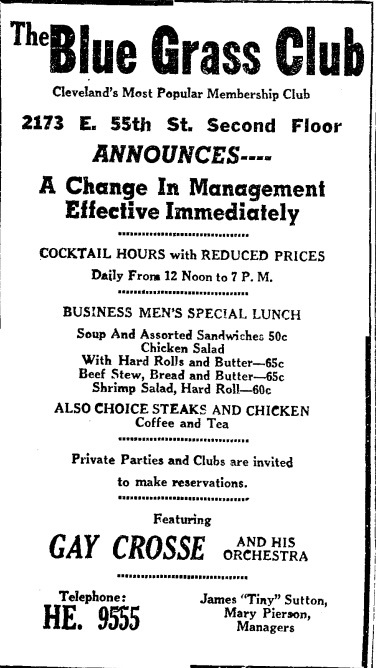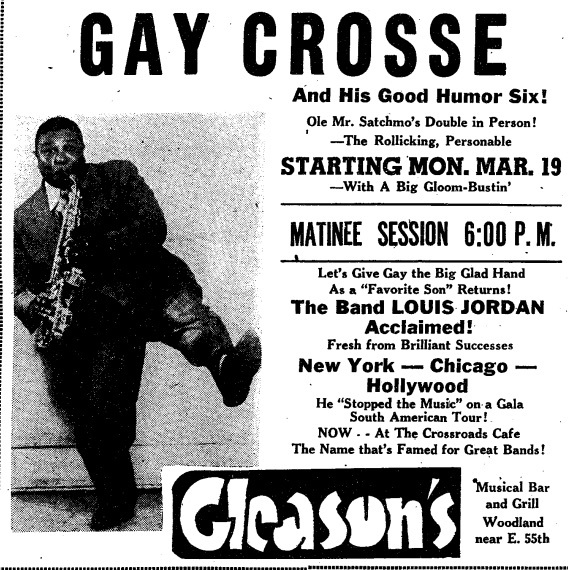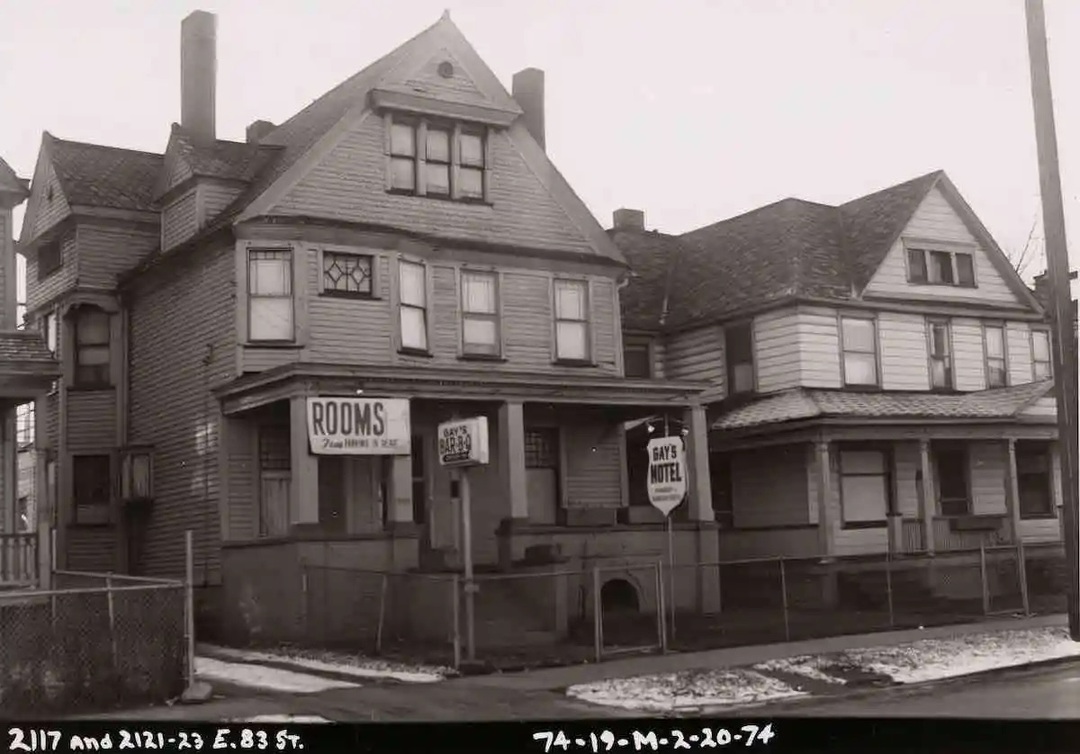
“Cleveland won’t appreciate Gay Crosse until he leaves here, plays the East, makes a success, then comes back.” — Louis Jordan, 1946
Sylvester G. Crosse, known to many as Gay Crosse, was born in 1916 in Mobile, Alabama. The exact year that Crosse and his family arrived in Cleveland is unknown. However, by the early 1930s, Crosse attended Central High School, where he played in the school's marching band. Crosse was known for being a talented vocalist and saxophonist who had the ability to charm any crowd. Two years after he graduated high school in 1934, Crosse and his band were under contract with the Amusement Service Bureau, which scheduled a small tour for Crosse and his orchestra to play at different local events and venues.
Crosse’s career as a musician in Cleveland skyrocketed in the 1940s. Crosse’s band, by then known as Gay Crosse and His Hellions, had a Saturday night residency at The Lucky Bar, sometimes called “The Lucky Room,” at 9812 Cedar Avenue from November 1941 until 1944. Crosse and his orchestra then played a six-week engagement at the newly opened Blue Grass Club located on the second floor of 2173 East 55th Street from December 1944 to February 1945. After his successful six-week engagement at Blue Grass Club, Gay Crosse and His Hellions were given a contract by Music Corporation of America (MCA), one of the largest agencies at the time with offices in London, New York, Chicago, Dallas, and Cleveland. Crosse returned to Blue Grass Club in October 1945 and played for a total of 27 months before parting ways in February 1948 to pursue other engagements. While Crosse grew the crowd of patrons at the Blue Grass Club during his two-year residency, he was also coming into national prominence when Crosse’s idol “the King of the Jukebox” Louis Jordan made him his protege in 1946. Jordan told a Call & Post reporter backstage at the Palace Theater, “Cleveland won’t appreciate Gay Crosse until he leaves here, plays the East, makes a success, then comes back.” Louis Jordan gave Crosse advice throughout his musical career and the two remained friends for many years.
After Gay Crosse and his band left Blue Grass Club in 1948, they began touring in July 1948 and were placed under new management with the Mason James Agency of Asheville, North Carolina. This tour was comprised of several one-night shows in Ohio, Pennsylvania, Virginia, North Carolina, South Carolina, Kentucky, Tennessee, and Alabama. Gay Crosse’s tour band included pianist Charlie Ross, bassist John Lathan, vocalist Walter “Mouse” Carson, trumpeter Eddie Harris, and an additional saxophonist Baron Lee. After their tour ended in the fall, Crosse and his band returned to Cleveland and played several nightclub venues. In 1949 Crosse and his band now known as Gay Crosse and his Good Humor Six landed a record deal with Capitol Recording Company. Crosse and his Good Humor Six released their first record for the label titled “Light Up and Relax.” At this time, Crosse noted that his band was trying to abandon the “Louis Jordan” style which they had come to be associated with, for a more modern be-bop style of music arranged by the band's pianist, Charlie Ross.
Crosse played several shows at Frolic Show Bar, a “black-and-tan” establishment in Detroit’s midtown in the winter of 1949. In early 1951, Crosse and his Good Humor Six briefly played at a popular club in Chicago called the Brass Rail and then made their way to Camden, New Jersey, and performed as the house band at Chubby’s, a popular restaurant and nightclub. That same year, John Coltrane began to play the tenor saxophone for the Good Humor Six. In March 1951, with the band's newest edition, the Good Humor Six played an extended engagement at Gleason’s located at 5219 Woodland Avenue. From June to early July of that same year, the band played a nightly show at Prospect Avenue’s Loop Lounge. Crosse and the Good Humor Six then returned to The Lucky Bar for the remainder of that summer. The band at this time which included John Coltrane also welcomed new members late in 1951. Specks Wright joined the band as a drummer and had previously played with Dizzy Gillespie. Crosse also welcomed a new trumpeter, James Robertson, who once played with Earl Hines’s band. These new members along with the band’s veteran musicians, played at Towne Casino, a popular mixed nightclub on Euclid Avenue near 105th Street, from January to February 1952. In early March to May 1952 Crosse and the Good Humor Six played at The Rose Room, previously known as Heat Wave inside Cleveland’s Majestic Hotel. The band played their new record, “Fat Sam From Birmingham” recorded for the Gotham label, which was a popular hit at the Rose Room. The band played at Club Ebony, sometimes referred to as the Ebony Lounge between East 69th and Cedar Avenue in November 1952. Crosse and his Good Humor Six played nightly shows at Club Congo, located on Woodland Avenue beginning in March 1953 to May 1954
While flourishing as a talented musician in Cleveland, Crosse decided to grow in prominence as a successful businessman. Crosse was the owner of Gay’s Hotel and Drive-In Bar-B-Q which was located at 2117 East 83rd. Gay’s Hotel in its early years was referred to as “Gay’s Tourist Home” which opened in April 1954. Gay’s Musicians and Entertainers Club was located next door to Gay’s Hotel at 2123 East 83rd and also opened that same year. Gay’s Drive-In Bar-B-Q opened in the rear of Gay’s Hotel in 1956.
It appears that Crosse and the Good Humor Six had parted ways in the late ’50s. This may be due to Crosse’s focus turning more towards his business pursuits rather than continuing his musical career. Gay Crosse experienced ongoing health issues during the later years of his life, and in 1971, at the age of 54, Crosse passed away due to complications during an open heart surgery performed at the Huron Road Hospital. Gay Crosse established a successful career as a popular jazz musician, both locally and nationally. Crosse became one of Cleveland’s most successful African American businessmen in the mid-twentieth century. His ability to entertain and charm the patrons of the numerous nightclub locations in Cleveland helped maintain Crosse’s image as one of the city’s best musicians of the time.
Images



